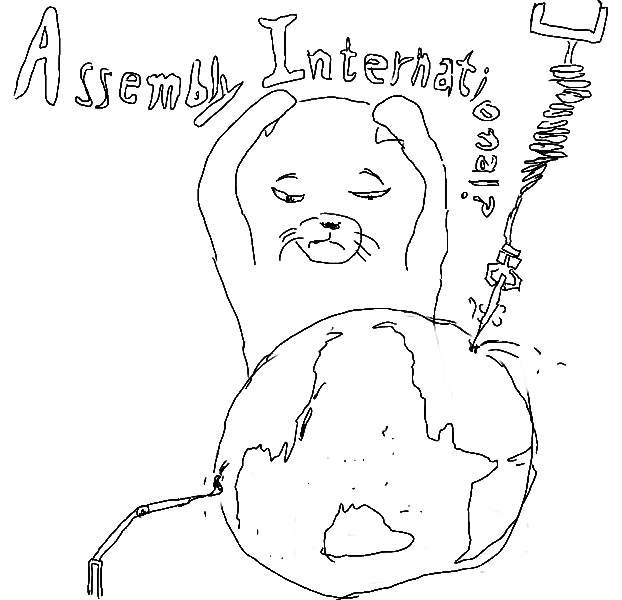|
terre thaemlitz writings 執筆 |
|
Making Friends at Assembly International - Terre Thaemlitz |

Illustration: Tsuji Aiko
- "Communities seem to be both a threat and a promise. Everyone interviewed strongly feels the limiting side effects of groups and classical identity politics. Everybody feels it is time for radically rethinking politics - but nobody can really imagine right now what form that could take or what specific actions or alliances we want to engage in. The fact that there are people locally and internationally who deal with a similar kind of social reality produces a sort of an accumulated knowledge that already has a political potential."
- Tara Herbst and Teodora Tabasci, "Assembly International"
My appearance at Assembly International on June 10, 2005, occurred without having the opportunity to meet the other participants, nor to properly familiarize myself with their work. For myself, this inability to "network" prior to the Assembly played an important and positive role in my own perceptions of the events that day. Although I usually advocate for audience discussion, I also felt the decision to exclude audience discussion contributed to the success of the event (even though I heard otherwise from some audience members). In my opinion, the non-stop onslaught of disjuntive information and presentation approaches relied upon participants and audience members being forced to "multi-process" opinions about the previous presentation while observing the next. This created a complex experience of building and losing connections that would have been denied by audience discussions, which would certainly have separated and crystalized presentations with little chance for spontaneous association and erosion between them.
As an Assembly concerned with notions of cultural exchange without the pretense of cultural alliance, I felt these circumstances actively engaged the notions of active disassociation laying at the core of many of our presentations. In fact, to disavow the potential for overt "dialogue" between presenters, as well as with audience members, (in all the conventional disfunctional forms one might imagine) struck me as the most effective way to avoid conceding to conventional models of "community building" which would have disserved the platform you proposed, as well as my own "agenda." Rather than presenting an Assembly of conclusions and connections, I believe you found a format which placed the burden of "dialogue" upon the days following the Assembly - upon the consecutive thoughts and actions of audience members and participants in our various local contexts outside of the Assembly. We were relieved of the mythical sensation of everyone coming together and drawing the same knowledge from the same well, freed to use the "waters drawn" as we independently see fit or possible within our home contexts. For myself, as someone who is always uncomfortable about being flown around the world to make my presentations harmonize with the often incongruous agendas of people I have never met or spoken with, this made for a rare and interesting experience.
It is predictable that some audience members would be disappointed by this "anti-network" approach, and long for more familiar Assembly decorum. However, I believe this view fails to identify Assembly International's format as being a critical response to conventional discussion formats, and simply identifies your format as a new standard without discussion (or worse yet, seeing it as a regression to more didactic, anti-discussion formats of the past).
"But," as Tara and Teodora stated in their opening comments that evening, "it's extremely important not to fall into over-seriousness or over-sincerity. Sincerity can be one of the most oppressive of political tools. We believe in the power of paradoxes and impossibilities. There are no oppositions, only different levels of humour."
In the end, I would say those who longed for more networking simply failed to appreciate the joke... and the critique... and that's okay.
- July 7, 2005